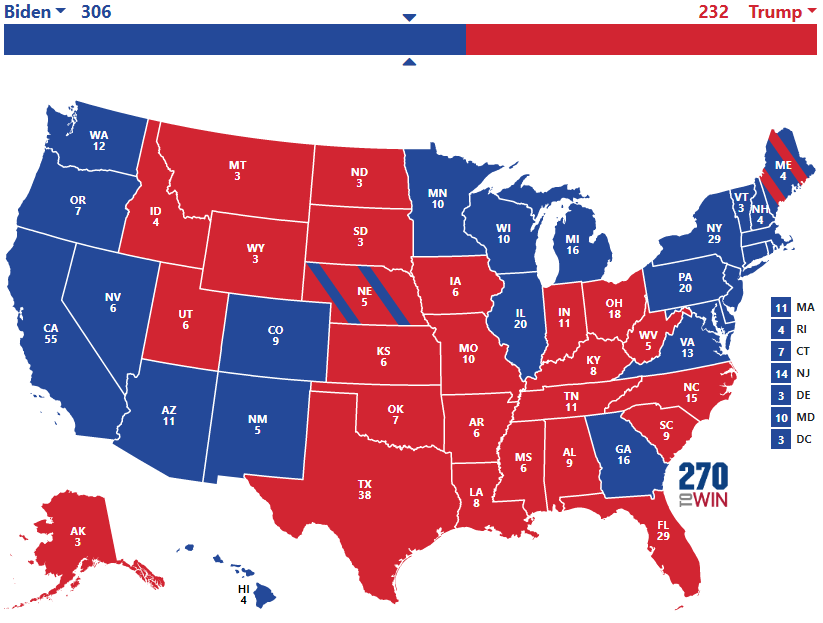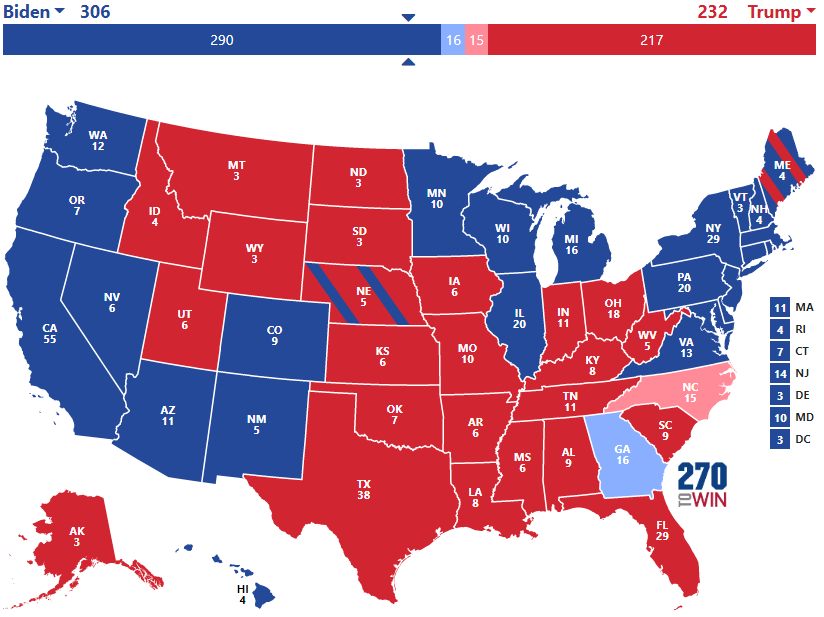Turkish writer Zeynep Tufecki thinks it's important we call the president's actions an attempted coup, despite its ridiculousness and incompetence:
Much debate has ensued about what exactly to call whatever Trump is attempting right now, and about how worried we should be. It’s true, the whole thing seems ludicrous—the incoherent lawsuits, the late-night champagne given to official election canvassers in Trump hotels, the tweets riddled with grammatical errors and weird capitalization. Trump has been broadly acknowledged as “norm shattering” and some have argued that this is just more of his usual bluster, while others have pointed out terminological issues with calling his endeavors a coup. Coup may not quite capture what we’re witnessing in the United States right now, but there’s also a danger here: Punditry can tend to focus too much on decorum and terminology, like the overachieving students so many of us once were, conflating the ridiculous with the unserious. The incoherence and incompetence of the attempt do not change its nature, however, nor do those traits allow us to dismiss it or ignore it until it finally fails on account of that incompetence.
The U.S. president is trying to steal the election, and, crucially, his party either tacitly approves or is pretending not to see it. This is a particularly dangerous combination, and makes it much more than just typical Trumpian bluster or norm shattering.
Maybe in other languages, from places with more experience with this particular type of power grab, we’d be better able to discuss the subtleties of this effort, to distinguish the postelection intervention from the Election Day injustices, to separate the legal but frivolous from the outright lawless, and to understand why his party’s reaction—lack of reaction—is not just about wanting to conclude an embarrassing presidency with minimal fanfare. But in English, only one widely understood word captures what Donald Trump is trying to do, even though his acts do not meet its technical definition. Trump is attempting to stage some kind of coup, one that is embedded in a broader and ongoing power grab.
And if that’s hard to recognize, this might be your first.
What makes this moment deeply alarming—and makes Republicans’ overwhelming silence and tacit approval deeply dangerous, rather than merely an attempt to run out the clock on the president’s clownish behavior—is that Trump’s attempt to steal this election builds on a process that has already entrenched minority rule around the country.
[I]gnoring a near catastrophe that was averted by the buffoonish, half-hearted efforts of its would-be perpetrator invites a real catastrophe brought on by someone more competent and ambitious. President Trump had already established a playbook for contesting elections in 2016 by casting doubt on the election process before he won, and insisting that he only lost the popular vote due to fraud. Now he’s establishing a playbook for stealing elections by mobilizing executive, judicial, and legislative power to support the attempt. And worse, much worse, the playbook is being implicitly endorsed by the silence of some leading Republicans, and vocally endorsed by others, even as minority rule becomes increasingly entrenched in the American electoral system.
Alarmism is problematic when it’s sensationalist. Alarmism is essential when conditions make it appropriate.
Our focus should not be a debate about the proper terminology. Instead, we should react to the frightening substance of what we’re facing, even if we also believe that the crassness and the incompetence of this attempt may well doom it this time. If the Republican Party, itself entrenching minority rule on many levels, won’t stand up to Trump’s attempt to steal an election through lying and intimidation with the fury the situation demands; if the Democratic Party’s leadership remains solely focused on preparing for the presidency of Joe Biden rather than talking openly about what’s happening; and if ordinary citizens feel bewildered and disempowered, we may settle the terminological debate in the worst possible way: by accruing enough experience with illegitimate power grabs to evolve a more fine-grained vocabulary.
Remember the key difference between the parties in the US: Democrats want to govern, but Republicans want to rule.
Just reviewing what I actually got up to yesterday, I'm surprised that I didn't post anything. I'm not surprised, however, that all of these articles piled up for me to read today:
- Dunn County, Wis., Democratic Party chair Bill Hogseth, writing in Politico, explains "why Democrats keep losing rural counties" like his.
- Ross Douthat asks, "why do so many Americans think the election was stolen?"
- Author Ben Judah explains why The Crown's portrayal of Prince Charles is wrong.
- The STBX administration's salted-earth activities include making the US citizenship test more political.
- The Federal Court for the District of Hawaii sentenced the corrupt former Honolulu police chief and his equally-corrupt ex-wife to prison for conspiracy, bank fraud, and other charges.
- The National Academy of Sciences has determined that a directed-microwave weapon sickened US diplomats in Havana, Cuba, but did not examine who fired it.
- Covid-19 has given us a whole new dictionary of workplace slang, according to 1843.
- The New Yorker's Alex Ross finds the moral closure of the 2004 film Downfall a little too facile.
- Divers in the Baltic Sea have found an Enigma coding device from May 1945.
- Though difficult to see from Chicago, a conjunction between Jupiter and Saturn will cause a rare double-planet effect this month, peaking when the planets are 6 arc-minutes apart on December 21st.
While I'm reading all of that, I've got a stew going in my Instant Pot (on slow-cooker mode). Unfortunately, it seems I underestimated the bulkiness of stew ingredients. I think I'll have a lot of leftovers:

So many things to read at lunchtime today:
- Philip Bump calls a video the soon-to-be-ex-president posted yesterday "the most petulant 46 minutes in American history."
- But whatever, because as David Graham points out, the STBXPOTUS is becoming irrelevant.
- As for voter fraud, and for accusing opponents of what you're actually the one doing, Georgia authorities have begun an investigation of a (Republican) Florida attorney who recommended to people that they illegally register to vote in Georgia ahead of the US Senate runoffs on January 5th, and even provided instructions.
- And speaking of lying about your opponents for political gain, the BBC calls bullshit on UK government claims that the EU would not have allowed the UK to approve the Pfizer vaccine as quickly as it did.
- If you live near Chicago, check out the Tribune's interactive map showing how every precinct in the six counties voted for president, US Senate, and the Fair Tax Amendment. As one of my friends pointed out, the line demarcating the Fair Tax vote between Evanston and Wilmette and the absence of such a demarcation on the Biden vote suggests that rich liberals say they're for fair taxes but don't actually vote for fair taxes.
- The National Science Foundation has released video from the Aricebo Observatory control tower showing its final collapse yesterday.
- Speaking of collapses, when you really think about it, Mount Rainier is actually the most dangerous volcano in the US. (Think: billions of liters of water locked up in its glaciers.)
- A shop in Kyoto has been selling mochi (grilled rice flour cakes) for over 1,000 years. And it's not even the oldest business in Kyoto.
- Google has made it easier for anyone, anywhere, to contribute to their Street View feature.
Finally, a year ago today I made some predictions about what could happen in the 2020 election. Turns out, "Option C" is true, and we're still waiting to see on a few others.
We've got a day and a half of autumn left in Chicago. Here's what I'm reading on a lazy Sunday:
And finally, new research shows that the pyroclastic flows from Vesuvius in 79 CE turned people's brains to glass. Yummy.
Every morning I get an email from The History Channel with "this day in history" bullet points. A couple stood out today:
And now, the sanity. Via author John Scalzi, (conservative) attorney T. Greg Doucette explains why the president will leave office on January 20th no matter what chicanery he tries to steal the election:
While I wait for my frozen pizza to cook, I've got these stories to keep me company:
Going to check my pizza now.

The New York Times and NBC have called Georgia for Joe Biden and North Carolina for the president, giving Biden 306 Electoral College votes to the president's 232. This is the first time a Democratic presidential candidate has won Georgia since Bill Clinton in 1992. It also means that in addition to taking over 5 million more popular votes than the president, Biden has won exactly the same number of electoral votes as the president did in 2016.
In 68 days, we'll finally have a new president.
Andrew Sullivan recognizes he's hyperventilating, but he has an important point:
Secretary of state Pompeo insisted with a smile that there would be a transition to a second Trump term, even as he lectures other countries about respecting election results. He is treating the solemn democratic process as a joke. “We are moving forward here at the White House under the assumption there will be a second Trump term,” echoed White House trade adviser, Peter Navarro, this morning.
To put it plainly: this simply does not happen in a healthy liberal democracy. It is a sign of the deepest imaginable rot. It is the kind of thing that occurs in developing countries with warlord leaders and fledgling democratic processes. It violates the sacredness of a peaceful and consensual transfer of power in America — marked first by George Washington.
It renders the US an international outlier in terms of democratic practices, and makes a mockery of any American pretension to be a model for democracy. We’re not. We’re increasingly a cautionary tale. And the damage this past week has already inflicted on basic democratic norms is incalculable. More foreign leaders have accepted Biden’s victory than Republican officials. Think about that for a bit.
Trump’s threat has never been that he wants to set himself up as a new Mussolini. His idleness and incompetence render that moot. His threat is that his psyche requires him to break every democratic norm, to hold the rule of law in contempt, and to deepen polarization so intensely that America becomes ungovernable at a federal level, and liberal democracy surrenders to one man’s ego.
Meanwhile, the AP has called Arizona, and I'm going to call Alaska on my own, so the electoral map will look like this until North Carolina and Georgia get done counting (and re-counting) their votes:

Eight days after the country resoundingly turfed out the president, it seems people still have overactive endocrine systems. I understand; coming down from a stressful experience can take some time. But seriously, we have to take a collective chill.
The president will leave office at noon Eastern time on January 20th whether he believes he lost the election or not. Mike Pompeo, Bill Barr, Betsy DeVos, and every other Cabinet-level officer will go as well. I expect, in fact, that Biden will have an executive order prepared for his signature, and minutes after he takes the Oath, every political appointee in the current administration will be fired.
None of the crap coming from the president, Pompeo, Barr, et alli, has anything to do with the election. If you look at their behavior from the perspective of a medium- or low-information voter on the other side, from the perspective as someone just as wound up about things as you are but with less ability than you have to tell truth from fiction, it makes a lot of sense. Because all of these lawsuits, personnel shifts, harping about a stolen election—it's all a big fundraising effort.
These people are grifters. They're thieves. They're the most corrupt batch of public officials the country has ever known, and I'm including the Harding, Jackson, and Andrew Johnson administrations. And the president will leave office with $400m in debts that he has to pay back personally within a few months. I will bet all the money in my pockets against all the money in your pockets that when his re-election committee files its disclosures later in the year, somehow a lot of the money the Republicans have raised post-election will go to pay some of those debts.
Maybe my feelings about Parker have depressed my ability to feel strong emotions about anything else. If so, it's one last gift he's giving me: an inoculation against the crazy that we will have to roll our eyes and live through for the next 70 days, 1 hour, and 11 minutes.
Author John Scalzi posted two missives on his blog over the weekend that sum up a lot of what I'm thinking lately. He concludes the second one:
Trump is a virus and he infected our body politic, a body that the GOP spent four decades lowering its immune system so that it could receive just the sort moral and political sickness that Trump personifies. And it worked! We got very sick, and we’re very sick still.
But it turns out our antibodies were stronger than suspected. We rallied despite the best efforts of the virus. And now we have the opportunity to get better. It’s not a done deal; the GOP is still out there trying to get us sick again, and our viral load is still regrettably high. But now, at least, there is a chance to rout it and get our body politic healthy again. That works for me, today.
Yes. And he has some particularly choice words for the 70 million people who voted to re-elect the president.